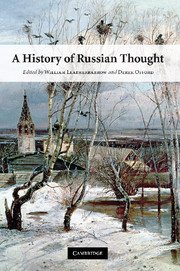Book contents
- Frontmatter
- Contents
- Preface
- List of contributors
- Dates, transliteration and other conventions
- Dates of reigns
- Russian titles of journals, newspapers and miscellanies
- PART I CONTEXT
- PART II INTELLECTUAL CURRENTS
- 4 Russia's eighteenth-century Enlightenment
- 5 Conservatism in the age of Alexander I and Nicholas I
- 6 Nihilism
- 7 Tradition and counter-tradition: the radical intelligentsia and classical Russian literature
- 8 Religious renaissance in the Silver Age
- PART III THEMES AND CONSTRUCTS
- PART IV THE AFTERLIFE OF CLASSICAL THOUGHT
- Biographical details of thinkers and writers
- Selected bibliography
- Index
7 - Tradition and counter-tradition: the radical intelligentsia and classical Russian literature
Published online by Cambridge University Press: 05 June 2012
- Frontmatter
- Contents
- Preface
- List of contributors
- Dates, transliteration and other conventions
- Dates of reigns
- Russian titles of journals, newspapers and miscellanies
- PART I CONTEXT
- PART II INTELLECTUAL CURRENTS
- 4 Russia's eighteenth-century Enlightenment
- 5 Conservatism in the age of Alexander I and Nicholas I
- 6 Nihilism
- 7 Tradition and counter-tradition: the radical intelligentsia and classical Russian literature
- 8 Religious renaissance in the Silver Age
- PART III THEMES AND CONSTRUCTS
- PART IV THE AFTERLIFE OF CLASSICAL THOUGHT
- Biographical details of thinkers and writers
- Selected bibliography
- Index
Summary
No class in Russian history has had a more momentous impact on the destinies of that nation or indeed of the modern world.
Martin Malia on the classical Russian intelligentsiaPART I: THE TRADITION
TRADITION AND COUNTER-TRADITION
In 1909, the critic Mikhail Gershenzon observed that ‘in Russia, an almost infallible gauge of the strength of an artist's genius is the extent of his hatred for the intelligentsia’. Largely true if somewhat exaggerated, Gershenzon's judgement provides the starting-point for this essay.
By and large, the most important ideas of Russian culture arose from an antagonistic dialogue between the radical intelligentsia and the great writers, with literary critics belonging to each group. On the one hand, we have the highly self-conscious tradition of intelligenty (members of the intelligentsia), whose patron saint was Chernyshevsky and which came to include Lavrov, Mikhailovsky, Nechaev, Lenin, Stalin and Trotsky. On the other, we have the counter-tradition of Tolstoy, Dostoevsky and Chekhov. Or again: Bakunin, Dobroliubov, Pisarev and Tkachev are answered by Solovev, Bakhtin and the contributors to the anthology in which Gershenzon's observation appears, Landmarks (1909).
Witnessing the danger of radical intelligentsia beliefs, the Russian counter-tradition developed a set of alternatives. Those alternatives probably represent the most durable contribution of Russian thought. Because both sides tended to extreme formulations, they framed issues sharply and made the stakes of intellectual debates especially clear. Russian intellectual history became a kind of uncontrolled experiment testing philosophical ideas.
- Type
- Chapter
- Information
- A History of Russian Thought , pp. 141 - 168Publisher: Cambridge University PressPrint publication year: 2010
- 2
- Cited by



